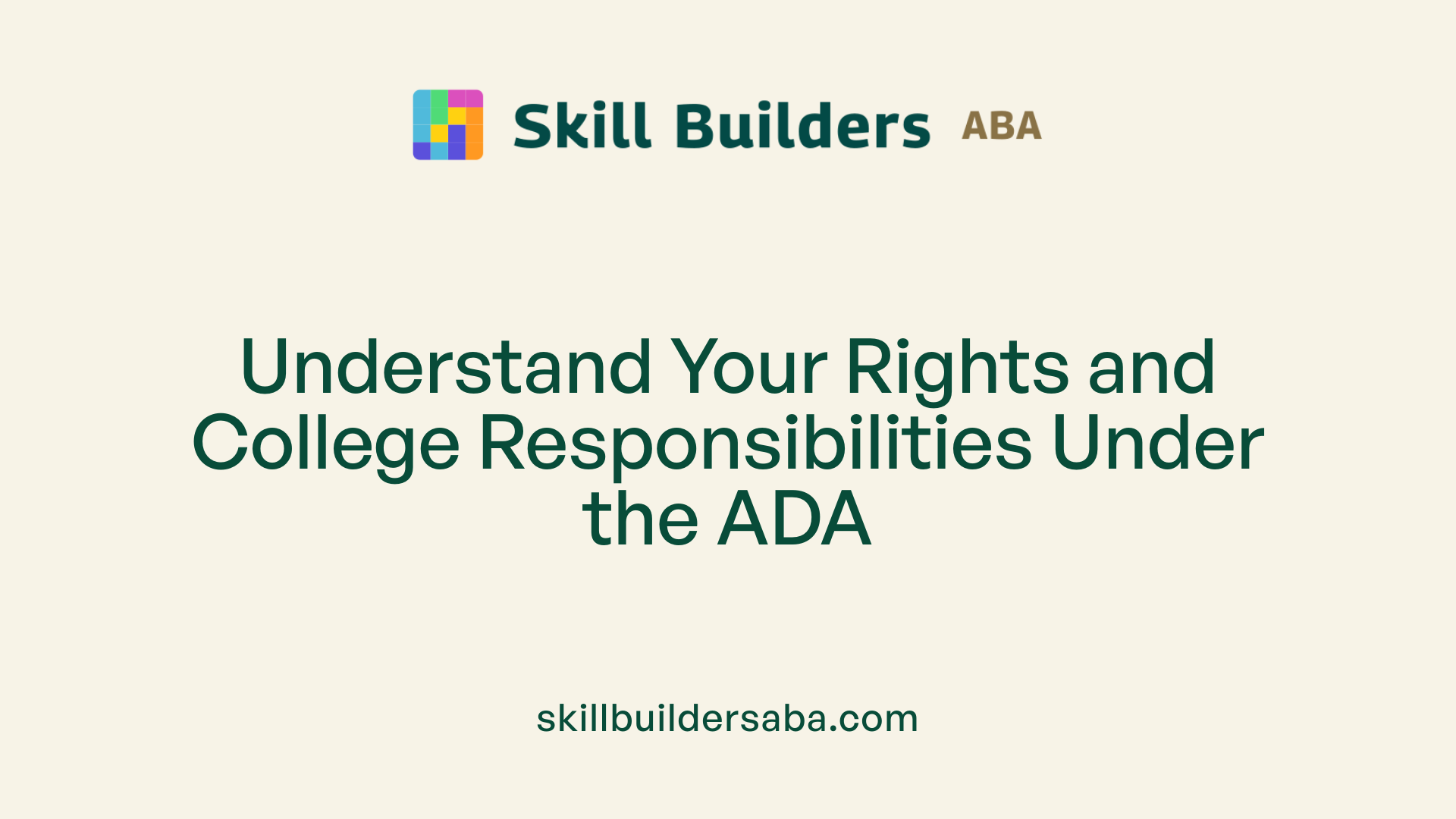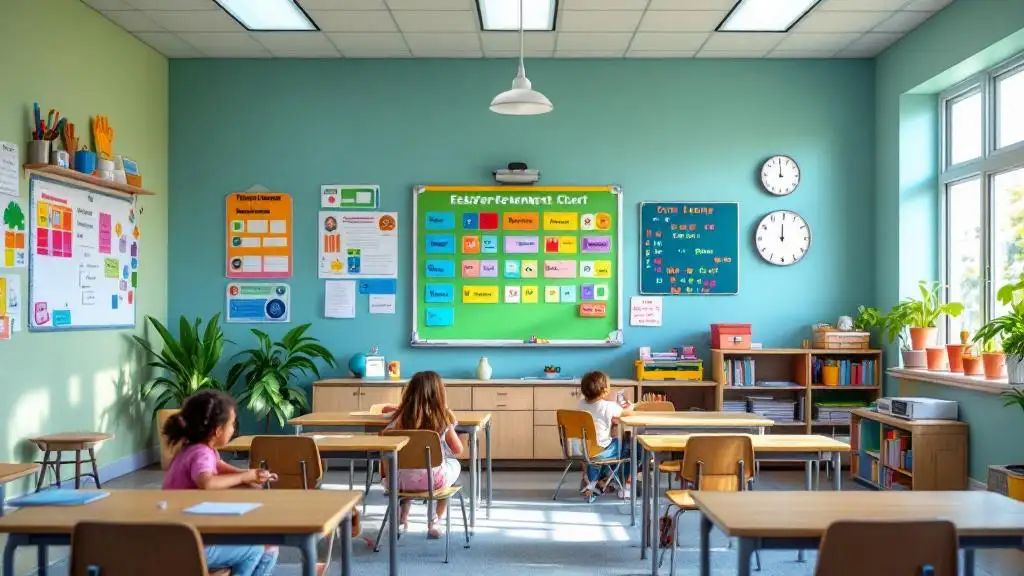Colleges For Autistic Students
Empowering Autistic Learners in Higher Ed

Opening Doors for Neurodiverse Students in College
The landscape of higher education is evolving to better support students with autism spectrum disorder (ASD). As awareness of neurodiversity increases, colleges and organizations across the United States are implementing specialized programs, accommodations, and resources tailored to meet the unique needs of autistic students. These initiatives aim not only to foster academic success but also to promote social integration, independence, and career readiness. This article explores the various college programs, support services, challenges faced by autistic students during transition, and guidance on accessing these vital resources.
Overview of College Support Programs for Autistic Students
 Many colleges and universities across the United States have developed specialized programs designed to support students on the autism spectrum. These programs often include a mix of academic, social, and life skills development tailored to meet individual needs.
Many colleges and universities across the United States have developed specialized programs designed to support students on the autism spectrum. These programs often include a mix of academic, social, and life skills development tailored to meet individual needs.
Types of Support Programs Support initiatives vary widely but often include dedicated intervention programs such as autism-specific transition support, mentoring, social skills groups, and counseling services. Notable examples are the Marshall University College Program for Students with Autism and the Kelly Autism Program at Western Kentucky University. Community colleges also play a crucial role, providing lower-cost options for gaining independence and managing academic demands. Some institutions focus on inclusive learning environments, offering classes with neurotypical students alongside autistic peers.
Support services offered Support services typically offered include accommodations such as extended testing time, noise-free testing rooms, note-taking assistance, and sensory-friendly environments. Many programs incorporate coaching in executive functioning, social communication, and independent living skills. Counseling and peer mentoring are common features to promote social inclusion and mental health. Specific initiatives often emphasize early transition planning, self-advocacy, and employment readiness. Additionally, some programs provide on-campus housing modifications to create comfortable living arrangements for students with sensory sensitivities.
Examples of institutions with relevant programs Numerous colleges are recognized for their commitment to supporting autistic students. These include:
| Institution | Program Name | Support Offered | Additional Details |
|---|---|---|---|
| Marshall University | College Program for Students with ASD | Academic, social, personal skills | Established in 2002, employs evidence-based strategies |
| Western Kentucky University | Kelly Autism Program | Mentoring, social activities, housing support | Offers a holistic approach to inclusion |
| Drexel University | Autism Support Program | Peer mentoring, social skills workshops | Does not require extra fees, praised for inclusiveness |
| Rochester Institute of Technology | Spectrum Support Program | Transition support, social skills | Focus on employment and community integration |
| Fairleigh Dickinson University | COMPASS Program | Academic, social skills, counseling | Designed for students with Asperger’s |
| University of Alabama | ASD College Transition Support | Skills for independence and social interaction | Emphasizes preparation for post-college life |
These programs are vital in helping students with autism access higher education and succeed academically and socially. As awareness grows, more institutions are creating tailored services, ensuring that students on the spectrum can thrive in diverse college environments.
Specialized Initiatives and Programs at Leading Institutions

Are there specific college programs or initiatives designed for neurodiverse students?
Many colleges across the United States have developed dedicated programs and initiatives to support neurodiverse students, including those with autism spectrum disorder, ADHD, dyslexia, and related learning differences. These programs aim to provide tailored services that promote academic success, social engagement, and independent living.
Examples of specialized programs include Landmark College in Vermont, which exclusively supports students with autism, ADHD, and other learning challenges. It offers associate and bachelor’s degree programs with extensive academic coaching and life skills training. Similarly, Beacon College in Florida is focused on students with learning differences, providing academic accommodations and social support.
Mainstream universities also offer targeted initiatives such as Eastern Michigan University’s College Supports Program and the Moss Scholars program at Bradley University. These programs typically include academic coaching, social skills groups, executive functioning support, mentoring, career development, and mental health services.
Support levels vary widely. Some programs charge additional fees, averaging around $3,500 per semester, while others are funded through scholarships, state agencies, or university budgets. Many institutions also coordinate with federal and state funding programs that help reduce costs for students.
Overall, the landscape of neurodiversity support in higher education is expanding. It reflects an understanding of the unique challenges faced by these students and a commitment to fostering their independence, academic achievement, and social integration.
Legal Rights and Institutional Responsibilities

Is autism recognized as a disability in college settings, and how does this affect access to support?
Autism is officially recognized as a disability in college environments under federal laws such as the Americans with Disabilities Act (ADA). This recognition makes it a legal obligation for postsecondary institutions to provide reasonable accommodations to students with autism, ensuring they have equal opportunities to succeed academically.
These accommodations can include extended time for tests, quiet or sensory-friendly testing rooms, note-taking services, and adjustments to living spaces like quiet dorm areas or modified lighting. Colleges also often offer specialized programs focused on social skills development, counseling, and vocational support, helping students manage social, organizational, and independent living challenges.
To access these supports, students must actively disclose their autism diagnosis to the college’s disability services office, providing necessary documentation from qualified professionals. This documentation typically includes diagnostic assessments and evidence of how autism impacts their academic functioning. Once approved, students can request specific supports tailored to their individual needs.
In summary, recognizing autism as a disability in college settings not only enforces legal support obligations but also opens the door for a variety of resources and programs designed to foster academic and personal success for students on the spectrum.
Transitioning from High School to College

Do autistic students face challenges transitioning to college, and what supports are helpful?
Many autistic students encounter difficulties when moving from high school to college. These challenges often include managing organization, executive functioning, social interactions, and independent living skills. Transitioning requires adjustments in daily routines, self-advocacy, and understanding of the new environment.
Colleges recognize these hurdles and offer a variety of supports to facilitate a smooth transition. Orientation programs specifically tailored for autistic students are common, featuring campus tours, workshops, and social events to foster familiarity and comfort. Peer mentoring programs connect new students with upperclassmen who can offer guidance and support.
Support services also include academic accommodations such as extended test times, quiet testing rooms, and note-taking assistance mandated under the Americans with Disabilities Act (ADA). Additionally, social skills groups, counseling, and social activities help build confidence and facilitate community engagement.
Specialized programs like the College Program for Students with Autism at Marshall University and similar initiatives nationwide provide early immersion, structured coaching, and personalized planning. Many of these programs start working with students during the summer before college begins, ensuring they develop necessary skills and understand available resources.
Early planning plays a crucial role. Starting as early as age 14 or earlier allows students to develop independence skills, learn to self-advocate, and become aware of campus support systems. Thorough preparation can include practicing routines, using organizational tools, and gaining experience with self-disclosure and requesting accommodations.
Overall, with effective supports and proactive planning, autistic students can overcome many initial hurdles and succeed academically, socially, and personally during their college years.
Choosing the Right College: Factors and Resources
When selecting a college or university, autistic students should consider several important factors to ensure their academic and social success. One of the most critical aspects is evaluating campus support services. Many institutions offer specialized programs such as mentoring, social skills groups, and counseling tailored for neurodiverse students. For example, programs like Drexel University’s Autism Support Program or the Marshall University College Program for Students with Autism provide comprehensive support that can make the transition easier.
Campus accessibility and living arrangements are also vital considerations. Students benefit from accessible facilities, sensory-friendly accommodations, and housing options like single dorm rooms or modified lighting to reduce sensory overload. Schools like Western Kentucky University’s Kelly Autism Program create inclusive living and learning environments, which can significantly support daily functioning.
Resources for decision-making and planning include organizations such as the College Autism Network, which offers extensive databases of autism support programs across the country. These resources help prospective students and families compare support levels, costs, and available services. Early planning, ideally beginning around age 14, allows students to develop self-advocacy skills such as requesting accommodations and using organizational tools like visual schedules.
Furthermore, considering options like community colleges or specialized programs can ease the transition by providing smaller classes, more personalized support, and a smoother pathway toward independence. Understanding the legal landscape is also essential; colleges accepting federal funds are required by law to provide reasonable accommodations, including extra test time and quiet testing spaces. Actively engaging with disability services and advocates can maximize access to these supports.
Ultimately, choosing the right college involves a thorough evaluation of campus resources, accessibility features, living arrangements, and available support programs. A well-informed decision can foster independence, academic achievement, and social connection, helping students with autism thrive during their college years.
Resources and Guidance for Students and Families

How do I access resources and support for autistic students in higher education?
Accessing appropriate resources and support for autistic students in college can significantly enhance their academic and social success. The first step is to connect with the campus disability services office, which is required by law (under the ADA) to provide reasonable accommodations such as extended test time, quiet rooms, and note-taking assistance. It’s important for students to proactively disclose their autism diagnosis and request the necessary accommodations.
Many colleges also host specialized programs that offer additional support beyond legal requirements. These programs may include social skills groups, mentoring, counseling, and life skills coaching. Organizations such as the College Autism Network (CAN) serve as comprehensive resources, featuring a database of autism-specific college programs, webinars, and research databases to guide students, families, and practitioners.
Online tools and directories are invaluable; websites like ThinkCollege and AffordableCollegesOnline.org list college options with tailored supports, including community colleges, vocational schools, and online programs. They also provide tips on evaluating campus accessibility, visiting campuses, and understanding what accommodations might be available.
National organizations such as Autism Speaks, Pathfinders for Autism, and the Autistic Self Advocacy Network offer guidance, advocacy, and connections to local and national resources. Many schools have dedicated support teams or programs like the Kelly Autism Program, Spectrum Support programs, or college-specific initiatives that focus on employment, academic success, and social integration.
Finally, participation in campus visits and evaluations helps students and families determine whether the campus environment, support services, and living arrangements suit their needs. Prepare questions about staff experience, available programs, and support options to ensure a good fit.
By researching and leveraging these diverse resources—ranging from campus offices to national support networks—students and families can pave the way for a successful college experience tailored to individual strengths and needs.
Fostering Independence and Social Skills for College Success
What skills are needed for college life, and how can autistic students develop them?
Navigating college requires a mix of practical and social skills. Autistic students especially benefit from developing independence in daily routines, academic responsibilities, and social interactions. Fundamental skills include attending classes regularly, managing personal hygiene, cooking simple meals, maintaining sleep schedules, and taking medications as needed.
To build these competencies, many students start early during high school with targeted transition programs, which teach routines, self-management techniques, and life skills. Practice with real-world tasks—like grocery shopping or budgeting—helps solidify these skills. Structured supports and gradual independence foster confidence and readiness.
Self-advocacy is crucial. Students should learn to communicate their needs effectively to college staff and request necessary accommodations such as extended test times or quiet testing environments. Organizational tools like visual schedules, planners, alarms, and digital reminders help manage time and tasks, reducing overwhelm.
Social skills are equally important for thriving in college. Participation in social skills groups, peer mentoring, and campus activities can boost confidence and social competence. Many institutions provide counseling, social skills training, and peer support networks designed for students on the autism spectrum.
Starting early, engaging in specialized training, and keeping consistent support can lay a strong foundation for students. The combination of these skills enables autistic students to transition smoothly into college life, achieve academic goals, and build meaningful social relationships.
Building Supportive Campus Environments and Cultivating Awareness
How do colleges create supportive environments for autistic students?
Colleges foster supportive settings for students with autism by implementing comprehensive training programs for faculty and staff. These educational initiatives increase awareness of autism spectrum disorder (ASD) and teach effective strategies for teaching, communication, and accommodations. When faculty understand sensory sensitivities and social challenges, they can adapt their teaching approaches accordingly.
Creating inclusive housing options is another vital element. Many campuses offer single dorm rooms or sensory-friendly living spaces designed to make autistic students feel more comfortable and secure. These environment adjustments help students settle in and focus on their academic and social lives.
Promoting campus-wide neurodiversity awareness is essential for cultivating an accepting community. Colleges often organize workshops, orientation sessions, and campaigns led by peer educators that address neurodiversity, reduce stigma, and encourage understanding among students and staff.
Supportive academic environments include accessible classrooms with noise-reduction features, quiet study zones, and proactive outreach from disability support services. These measures ensure that autistic students can navigate campus life with confidence.
Finally, involving neurodiverse students in planning and policy development helps institutions tailor their efforts to actual student needs, creating environments that are inclusive, respectful, and empowering for everyone.
Research, Resources, and Advocacy in Higher Education
Role of organizations like the College Autism Network
The College Autism Network (CAN) plays a pivotal role in improving access, experiences, and outcomes for college students with autism. It offers a comprehensive database of autism-specific college programs, helping students and families find suitable support services across the U.S. CAN also hosts the annual College Autism Summit, which brings together educators, service providers, students, and researchers to share insights and develop best practices. Through these efforts, CAN advocates for increased awareness and better accommodations in higher education.
Research databases and literature
Research and knowledge sharing are vital for advancing effective supports for autistic college students. CAN provides access to research databases and literature reviews focusing on autism in higher education. These resources help educators and researchers understand the unique challenges faced by students and inform evidence-based practices. The site also hosts webinars and publishes updates on the latest findings, fostering a well-informed community committed to continuous improvement.
Events and advocacy efforts
Advocacy is central to creating inclusive educational environments. The College Autism Network organizes events such as conferences and summits that promote dialogue among stakeholders including students, families, educators, and policymakers. These gatherings support advocacy efforts to ensure legislation and campus policies evolve to meet the needs of neurodiverse students. Additionally, organizations like Autism Speaks, Pathfinders for Autism, and the Autism Higher Education Foundation work alongside CAN to advocate for expanded programs, funding, and awareness initiatives. Their collective efforts are shaping a more supportive and accessible higher education landscape for students on the autism spectrum.
Supporting Autistic Students in Higher Education
The movement to support autistic students in higher education continues to grow, driven by dedicated programs, legal protections, and a collective commitment to neurodiversity. From specialized campus initiatives and accommodations to early transition planning and independent skills development, the landscape is increasingly inclusive. Students and their families are encouraged to actively seek out resources, advocate for their needs, and select colleges that align with their aspirations and support requirements. As understanding deepens and barriers are dismantled, autistic students are better equipped to thrive academically, socially, and professionally. Education institutions are essential partners in this journey, fostering environments where neurodiverse learners can succeed and contribute meaningfully to campus communities and beyond.
References
- College Programs for Students with Autism
- College Programs - College Autism Spectrum
- How to Find the Right College for Autistic Students - SPARK for Autism
- 19 Best Colleges for Neurodivergent Students - IvyWise
- College Autism Network
- How to Find Autism-Friendly Colleges - U.S. News & World Report
- College Autism Spectrum (CAS) - College Autism Spectrum
.svg)














